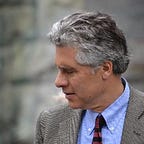Biology as Information Processing
We can thank DNA for our deep urge to make sense of the world and for the inherent limitations of that urge
“Tell me a story.” The request is as old as language itself. I’m willing to bet that the day after symbolic language was used to count grain or plan a hunt, it was used to tell the story of the harvest or the exploits of the hunters. It’s a truism: Humans are story-telling animals. We remember and learn from stories far better than we do from a raw recitation of the facts. Humans are, in the words of the philosopher Paul Boghossian, “ineluctable seekers of meaning”.
The human urge for the meaning we get from stories, is well documented. But why? What makes us crave the narrative arc; the beginning, middle and end; and the moral insight or kernel of truth that lies at the heart of every good story? Well, I have a theory….
“The story of life is a story of information processing” a biologist friend once said to me. And, as is my weakness, I set about contemplating, at length, the ways in which his statement might be true.
Spoiler alert: It is “true” — in the sense that it is a useful insight and, more important, it has deep and revealing implications for all of us humans.
Think about it. DNA is coded information, right? It is information about the environment and how to build a being to survive and reproduce. DNA’s great innovation is the ability to capture, store, and re-use information about the world, a capability that enables the DNA’s “owner” to adapt more successfully. Ditto for synapses and brains, only in their case, the capture and re-use of the information happens in near real time, instead of across generations.
How about the human invention of language and the written word? They are yet another information processing capability — only now sharable with others and over time. What’s more, knowledge can now accumulate, a huge innovation that makes our potential for using information essentially infinite — continuously growing in scope and value.
Next up, computation: today, digital processing makes retrieval and replication nearly instantaneous and functionally flawless. Further down this road, our computers will get smarter than we are, a story we will leave for another day.
Ok, so there’s your answer. We seek meaning because it is what living systems have always done. Coded information is the main (the only?) difference between “Life” and “not-life”. It’s the reason that humans have been able to over-run the planet.
It works for us, so naturally we do it, over and over, even to a fault. We do it until we discover technologies that can blow us all up or destroy the environment. We do it until we see patterns and causation where there is none. We do it everywhere, hypothesizing gods, and physics, and the “deep-state” to explain our surroundings. Fortunately we also invented science, which forces us to test our crazy imaginings against empirical reality. That helps a lot.
The biological source of our urge to make sense also begins to shed light on a bunch of stuff that is mysterious about humans — like the reasons for wonder and curiosity and imagination. And it explains the deep satisfaction we get when something finally makes sense or we learn something new (see “See-level”). They are all adaptive!
But that’s not even the most remarkable implication. To me, the coolest thing about this theory is that all of this understanding is “wrong” by definition (see: “Wrong but Useful”). Information theory tells us that all coding is a simplification, which means that some information is always lost in the process. So, no matter how detailed and granular our coded view of the world, it will always be incomplete and uncertain. Like a digital picture — no matter how fine the pixels and no matter how closely packed, there’s still those damned spaces.
This fundamental limitation has implications for virtually every area of human endeavor — science, politics, the arts and many others — implications for our understanding of the world and our place in it. But that’s another story altogether.
